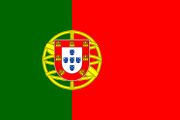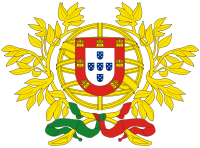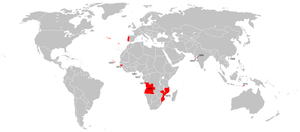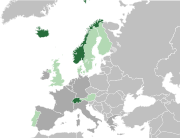Estado Novo (Portugal)
|
|||||||||||||||||||||||||||||||||||||||||||||||||||||||||||||
| History of Portugal series |
|---|
|
| Topics |
|
| Timeline of Portuguese history |
Estado Novo (Portuguese for "New State", pronounced [(ɨ)ʃˈtadu ˈnovu]; also known as the Second Republic) is the name of the Portuguese authoritarian regime installed in 1933, following the army-led coup d'état of 28 May 1926 against the democratic First Republic. The "Estado Novo" ("New State"), greatly inspired by conservative and fascist ideologies, was developed by António de Oliveira Salazar, ruler of Portugal from 1932 to 1968. Opposed to communism, socialism, liberalism and anti-colonialism, the pro-Catholic Estado Novo regime advocated the prepetuation of Portugal as a pluricontinental empire. Under the Estado Novo regime, Portugal preserved a vast centuries-long empire with a total area of 2,168,071 km2.[1] Fiercely criticized by most of the international community after the Second World War and the European decolonization, the regime and its secret police repressed elemental civil liberties and political freedoms in order to avoid communist influence and the dissolution of its coveted empire. The country joined the United Nations in 1955, and was a founding member of NATO (1949), OECD (1961) and EFTA (1960).
Contents |
Prelude
King Carlos I of Portugal confirmed colonial treaties of the 19th century that stabilized the situation in Portuguese Africa. These agreements were however unpopular in Portugal where they were seen as being to the disadvantage of the country. In addition, Portugal was twice declared bankrupt - on June 14, 1892, and again on May 10, 1902 - causing industrial disturbances, socialist and republican antagonism and press criticism of the monarchy. Carlos responded by appointing João Franco as prime minister and subsequently accepting parliament's dissolution. In 1908, King Charles of Portugal was killed in a regicide at Lisbon. The Portuguese monarchy lasted until 5 October 1910, when through a revolution it was overthrown and Portugal was proclaimed a republic. The overthrow of the Portuguese monarchy in 1910 led to a sixteen-year struggle to sustain parliamentary democracy under republicanism - the Portuguese First Republic (1910–1926).
The 28th May 1926 coup d'état or, during the period of Estado Novo, the National Revolution (Portuguese: Revolução Nacional), was a military action that put an end to the chaotic Portuguese First Republic and initiated the Ditadura Nacional (National Dictatorship) (years later, renamed Estado Novo).
António de Oliveira Salazar developed the Estado Novo. The basis of his regime was a platform of stability. Salazar's early reforms benefited the whole nation since they allowed financial stability and therefore economic growth. After the chaotic years of the Portuguese First Republic (1910–1926) when not even public order was achieved, this looked like an impressive breakthrough to most of the population; Salazar achieved his height in popularity at this point. This transfiguration of Portugal was then known as "A Lição de Salazar" - Salazar's Lesson. Salazar's program was opposed to communism, socialism, and liberalism. It was pro-catholic, conservative and nationalistic. Its policy envisaged the perpetuation of Portugal as a pluricontinental empire, financially autonomous and politically independent from the dominating superpowers, and a source of civilization and stability to the overseas societies in the African and Asian possessions.
Regime
The Estado Novo was an authoritarian regime with an integralist orientation, which differed from fascist regimes by its lack of expansionism, lack of a charismatic leader, lack of party structure and more moderate use of state violence.[2] However it incorporated the principles for its military from Mussolini's system. Salazar was a Catholic traditionalist who believed in the necessity of control over the forces of economic modernisation in order to defend the religious and rural values of the country, which he perceived as being threatened. One of the pillars of the regime was the PIDE, the secret police. Many political dissidents were imprisoned at the Tarrafal prison in the African archipelago of Cape Verde, on the capital island of Santiago, or in local jails. Strict state censorship was in place.
The Estado Novo enforced Nationalist and Catholic values on the Portuguese population. The whole education system was focused toward the exaltation of the Portuguese Nation and its 5 century old overseas territories (the Ultramar). The motto of the regime was Deus, Pátria e Familia (meaning God, Fatherland and Family and obviously intended as a counterpart to the French Revolution's "Liberté, égalité, fraternité"). After 1945, the main raison d'être of the regime became resistance to the wave of decolonization which swept Europe after the end of World War II.
The Estado Novo accepted the idea of corporatism as an economic model. Although Salazar refused to sign the Anti-Comintern Pact in 1938, the Portuguese Communist Party was intensely persecuted. So were Anarchists, Liberals, Republicans and anyone opposed to the regime. The only allowed party was the União Nacional (National Union), which encompassed a wide range of right-wing politics, passing through monarchism, corporatism, para-fascism, nationalism and capitalism.
The Legião Nacional was a Popular Militia similar to the Italian Blackshirts. For young people there was the Mocidade Portuguesa, an organization similar in organization (but not in ideology) to the Hitler Youth. These two organizations were heavily supported by the State and imposed a martial style of life.
Despite similarities in their political structures, and mutual distrust of Communism, the Third Reich and Estado Novo had little time for each other. Portuguese authorities assisted Germany in secretly supporting nationalist forces in the Spanish Civil War, however both Salazar and the Portuguese public felt they could not trust Hitler, especially as Germany began to dominate its neighbors in the years leading up to the Second World War. During the Second World War Portugal remained neutral. It was bound by the 550-year old Treaty of Windsor, the world's oldest diplomatic alliance, to afford assistance to Britain. Portugal refused to declare war on the Axis powers, but granted the allies access to establish military bases on the Azores. In 1942 Australian troops briefly occupied Portuguese Timor in advance of their occupation by the Japanese.
In 1958 incumbent president Craveiro Lopes was coerced to resign by Salazar and presidential elections were held. Naval minister and staunch conservative Américo Thomaz was the candidate favoured by Salazar. General Humberto Delgado was the opposition candidate. Delgado was credited with only around 25% of the votes with 52.6% in favor of Thomaz[3], despite the consensual opinion that Delgado was the true winner and some evidence of ballots stuffed with votes for Thomaz by the PIDE. After the elections Delgado was expelled from the Portuguese military, and took refuge in the Brazilian embassy before going into exile, spending much of it in Brazil and later in Algeria. To keep opposition candidates from coming to power in 1959 the government abolished direct election of presidents in favor of election by an electoral college.[4]
On January 23, 1961 military officer and politician Henrique Galvão led the hijacking of Portuguese passenger ship "Santa Maria" en route from Curaçao to Havana. The terrorist operation was successful as anti-regime propaganda but killed one officer (3rd Pilot Nascimento Costa) and wounded several others in the process of taking complete command over the ship. Galvão would later claim that his intentions were to sail to the Overseas Province of Angola to set up in Luanda a renegade Portuguese government in opposition to Salazar. The journey of the hijacked "Santa Maria" was eventually cut short due to a troubled engine and problems with the 900 captives on the ship, and Galvão released the passengers in negotiation with Brazilian officials in exchange for political asylum in Brazil.
In 1964 Delgado founded the Portuguese National Liberation Front in Rome, stating in public that the only way to end the Estado Novo would be by a military coup, while many others advocated a national uprising approach.
Delgado and his Brazilian secretary, Arajaryr Moreira de Campos, were murdered on 13 February 1965 in Spain after being lured into an ambush by PIDE.
Economy
During the 1940s and 1950s Portugal experienced economic growth due to increased raw material exports to the war-ravaged and recovering nations of Europe. However, until the 1960s, the country remained very poor and largely underdeveloped due to its disadvantaged starting position. Salazar managed to discipline the Portuguese economy, after the chaotic First Portuguese Republic of 1910–1926. A brand new road system was built, new bridges spanned the rivers and the Educational Program was able to build a primary school in each Portuguese town (an idea developed and begun during the democratic First Republic). Some liberal economic reforms advocated by elements of the ruling party, which were successfully implemented under similar circumstances in neighboring Spain, were rejected out of fear that industrialization would destabilize the regime and its ideological base and would strengthen the Communists and other left-wing movements. In 1962 the "Academic Crisis" occurred. The regime, fearing the growing popularity of democratic ideas among the students, carried out the boycott and closure of several student associations and organizations, including the important National Secretariat of Portuguese Students.
The students, with strong support from the Portuguese Communist Party, responded with demonstrations which culminated on March 24 with a huge student demonstration in Lisbon that was brutally suppressed by the shock police, which led to hundreds of student injuries. Immediately thereafter, the students began a strike that marked a significant point in the resistance against the regime. The fear of many young men for the dangers of the Portuguese Colonial War resulted in hundreds of thousands of Portuguese workers each year leaving to seek better economic and political conditions in more developed countries, or to escape conscription. In over 15 years nearly one million emigrated to France, another million to the USA, many hundreds of thousands to Germany, Switzerland, the UK, Luxembourg, Venezuela or Brazil. Political parties, such as the Socialist Party, persecuted at home, were established in exile. The only party which managed to continue (illegally) operating in Portugal during all the dictatorship was the Portuguese Communist Party.
The liberalization of the Portuguese economy gained a new impetus under Salazar's successor, Prime Minister Marcello José das Neves Caetano (1968-74), whose administration abolished industrial licensing requirements for firms in most sectors and in 1972 signed a free trade agreement with the newly enlarged European Community. Under the agreement, which took effect at the beginning of 1973, Portugal was given until 1980 to abolish its restrictions on most community goods and until 1985 on certain sensitive products amounting to some 10 percent of the EC's total exports to Portugal. Starting in 1960, EFTA membership and a growing foreign investor presence contributed to Portugal's industrial modernization and export diversification between 1960 and 1973. Caetano moved on to foster economic growth and some social improvements, such as the awarding of a monthly pension to rural workers who had never had the chance to pay social security. Some large scale investments were made at national level, such as the building of a major oil processing center in Sines. Notwithstanding the concentration of the means of production in the hands of a small number of family-based financial-industrial groups, Portuguese business culture permitted a surprising upward mobility of university-educated individuals with middle-class backgrounds into professional management careers. Before the 1974 Carnation Revolution, the largest, most technologically advanced (and most recently organized) firms offered the greatest opportunity for management careers based on merit rather than on accident of birth. In 1960, at the initiation of Salazar's more outward-looking economic policy, Portugal's per capita GDP was only 38 percent of the European Community (EC-12) average; by the end of the Salazar period, in 1968, it had risen to 48 percent; and in 1973, under the leadership of Marcelo Caetano, Portugal's per capita GDP had reached 56.4 percent of the EC-12 average.[5] On a long term analysis, after a long period of economic divergence before 1914, and a period of chaos during the Portuguese First Republic, the Portuguese economy recovered slightly until 1950, entering thereafter on a path of strong economic convergence with the wealthiest economies of Western Europe, until the Carnation Revolution in April 1974.[6] Portuguese economic growth in the period 1950-1973 under the Estado Novo regime (and even with the effects of an expensive war effort in African territories against independence guerrilla groups), created an opportunity for real integration with the developed economies of Western Europe. Through emigration, trade, tourism and foreign investment, individuals and firms changed their patterns of production and consumption, bringing about a structural transformation. Simultaneously, the increasing complexity of a growing economy raised new technical and organizational challenges, stimulating the formation of modern professional and management teams.[7]
Education
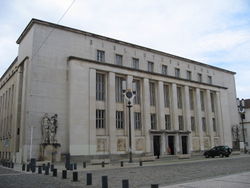
Until the 1960s, post-primary education was limited to a tiny elite. In general, teenagers used to leave school and start to work early. In contrast with other European nations, the country had had a poor record in educational policies since the 19th century. By the end of the 19th century the illiteracy rate was at over 80 percent and higher education was reserved for a small percentage of the population. 68.1 percent of Portugal's population was still classified as illiterate by the 1930 census. Portugal's literacy rate by the 1940s and early 1950s remained low for North American and Western European standards at the time. However, in the 1960s the country made public education available for all children between the ages of six and twelve, founded universities in the overseas provinces of Angola and Mozambique (the University of Luanda and the University of Lourenço Marques during the period of Adriano Moreira as Minister of the Overseas Provinces), recognized the Portuguese Catholic University in 1971, and by 1973 a wave of new state-run universities were founded across mainland Portugal (the Minho University, the New University of Lisbon, the University of Évora, and the University of Aveiro - Veiga Simão was the Minister in charge for education by then). In addition, the long established Lisbon and Coimbra universities were highly expanded and modernized in the 1960s. New buildings and campuses were constructed, like the Cidade Universitária (Lisbon) and the Alta Universitária (Coimbra). The last two decades of the Estado Novo, from the 1960s to the 1974 Carnation Revolution, were marked by strong investment in secondary and university education, which experienced in this period one of the fastest growth rates of Portuguese education history to date. Though this corresponded to significant growth of post-primary enrollment in larger urban areas, yet there was a gap to be filled in the following years, given the little time to overcome their disadvantaged starting position. The massification of secondary education was only achieved in late 1970s and 1980s, so by the time of the Carnation Revolution in 1974 illiteracy was receding, but low-literacy and illiteracy was still high, compared with the highest standards already achieved by the most developed countries in the world.
Egas Moniz, a Portuguese physician who developed the cerebral angiography and leucotomy, received in 1949 the Nobel Prize in Physiology or Medicine - even now, the only Portuguese recipient of a Nobel in the sciences.
The end of the regime
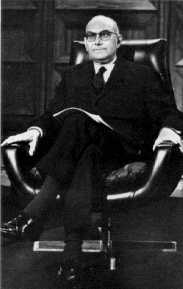
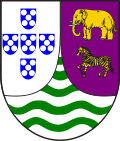
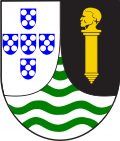
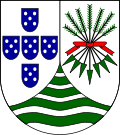
The end of the Estado Novo began with the uprisings in the colonies in the 1960s. The independence movements active in Portuguese Angola, Portuguese Mozambique and Portuguese Guinea were supported by both the United States and the Soviet Union, which both wanted to end all colonial empires and expand their own spheres of influence. For the Portuguese ruling regime, the overseas empire was a matter of national interest. The wars had the same effects in Portugal as the Vietnam War in the United States, or the Afghanistan War in the Soviet Union; they were unpopular and expensive lengthy wars which were isolating Portugal's diplomacy, leading many to question the continuation of the war and, by extension, the government. Although Portugal was able to maintain some superiority in the colonies by its use of elite paratroopers and special operations troops, the foreign support to the guerrillas, including arms embargoes and other sanctions against the Portuguese, made them more maneuverable, allowing them to inflict losses on the Portuguese army. The international community isolated Portugal due to the long-lasting Colonial War. The situation was aggravated by the death of Salazar, the strong man of the regime, in 1970. His replacement was one of his closest advisors, Marcelo Caetano, who tried to slowly democratize the country, but could not hide the obvious dictatorship that oppressed Portugal.
By the early 1970s, the Portuguese Colonial War continued to rage on, requiring a steadily increasing budget. The Portuguese military was overstretched and there was no political solution or end in sight. While the human losses were relatively small, the war as a whole had already entered its second decade. The Portuguese ruling regime of Estado Novo faced criticism from the international community and was becoming increasingly isolated. It had a profound impact on Portugal - thousands of young men avoided conscription by emigrating illegally, mainly to France and the US.
The war in the colonies was increasingly unpopular in Portugal itself as the people became weary of war and balked at its ever-rising expense. Many ethnic Portuguese of the African overseas territories were also increasingly willing to accept independence if their economic status could be preserved. In 1974, the Carnation Revolution in Lisbon, organized by left-wing Portuguese military officers - the Armed Forces Movement (MFA), overthrew the Estado Novo regime.
The military-led coup can be described as the necessary means of bringing back democracy to Portugal, ending the unpopular Colonial War where thousands of Portuguese soldiers had been commissioned, and replacing the authoritarian Estado Novo (New State) regime and its secret police which repressed elemental civil liberties and political freedoms. However, the military coup's organization started as a professional class[8] protest of Portuguese Armed Forces captains against a decree law: the Dec. Lei nº 353/73 of 1973.[9] Younger military academy graduates resented a program introduced by Marcello Caetano whereby militia officers who completed a brief training program and had served in the overseas territories' defensive campaigns, could be commissioned at the same rank as military academy graduates. Caetano's Portuguese Government had begun the program (which included several other reforms) in order to increase the number of officials employed against the African insurgencies, and at the same time cut down military costs to alleviate an already overburdened government budget. The MFA-led National Salvation Junta, a military junta, took the power.
Aftermath
After a period of social unrest, factionalism, and uncertainty in Portuguese politics, between 1974 and 1976, both far left and far right radicalism didn't prevail. However, pro-communist and socialist elements retained control of the country for several months before elections. By 1975, all the Portuguese African territories were independent and Portugal held its first democratic elections in 50 years. The Carnation Revolution military coup of April 1974 in Lisbon resulted in the exodus of over 1 million Portuguese civilian citizens from the African territories as destitute refugees - the Retornados.[10][11][12][13]
See also
- Timeline of Portuguese history - Second Republic: Authoritarian Estado Novo
- The Portuguese Carnation Revolution
- Estado Novo (Brazil)
- Yves Guérin-Sérac
- Jacques Ploncard, a French Petainist, counsellor of Salazar
- Portuguese Legion (Estado Novo)
Notes
- ↑ Portugal Não É Um País Pequeno
- ↑ Kallis, Aristotle A. Fascism Reader p. 313-317 2003 Routledge
- ↑ http://www.portugal-info.net/history/second-republic.htm
- ↑ History of Portugal
- ↑ Problems of Democratic Transition and Consolidation, Juan José Linz
- ↑ (Portuguese) Fundação da SEDES - As primeiras motivações, "Nos anos 60 e até 1973 teve lugar, provavelmente, o mais rápido período de crescimento económico da nossa História, traduzido na industrialização, na expansão do turismo, no comércio com a EFTA, no desenvolvimento dos sectores financeiros, investimento estrangeiro e grandes projectos de infra-estruturas. Em consequência, os indicadores de rendimentos e consumo acompanham essa evolução, reforçados ainda pelas remessas de emigrantes.", SEDES
- ↑ [1], Joaquim da Costa Leite (Aveiro University) - Instituições, Gestão e Crescimento Económico: Portugal, 1950-1973
- ↑ (Portuguese) Cronologia: Movimento dos capitães, Centro de Documentação 25 de Abril, University of Coimbra
- ↑ (Portuguese) Arquivo Electrónico: Otelo Saraiva de Carvalho, Centro de Documentação 25 de Abril, University of Coimbra
- ↑ Portugal Migration, The Encyclopedia of the Nations
- ↑ Flight from Angola, The Economist (August 16, 1975).
- ↑ Dismantling the Portuguese Empire, Time Magazine (Monday, July 07, 1975).
- ↑ Portugal - Emigration, Eric Solsten, ed. Portugal: A Country Study. Washington: GPO for the Library of Congress, 1993.
|
|||||||||||||||||||||||||||||
